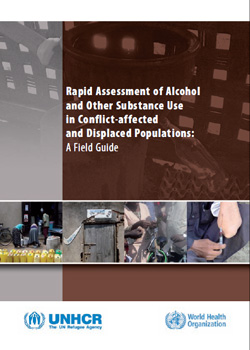Substance use in conflict and disaster situations
The UN High Commissioner on Refugees and the World Health Organization have produced a field guide for how to address alcohol and drug problems in populations affected by disaster or conflict.(Photo: UNHCR/B.Bannon)
 Many relief and development agencies have experienced growing alcohol- and drug-related problems among people in emergency situations; among internally displaced persons, in refugee camps, in civil war or other armed conflicts etc.
Many relief and development agencies have experienced growing alcohol- and drug-related problems among people in emergency situations; among internally displaced persons, in refugee camps, in civil war or other armed conflicts etc.
A field guide produced by UNHCR (the UN Refugee Agency) and the World Health Organization addresses these problems, which have been given little attention earlier. The guide is named Rapid Assessment of Alcohol and Other Substance Use in Conflict-affected and Displaced Populations; A field Guide.
In the introduction to the manual it is said that in settings of conflict and displacement, as elsewhere, the social problems associated with alcohol and other substance use are considerable. These include gender-based violence, organized crime and the serious neglect of children. In addition, the financial burden of alcohol and other substance use has a negative impact on household economies and food security, resulting in under-nutrition and ill health.
The guide points at a variety of reasons given for substance use among conflict-affected and displaced populations, e.g. self-medication for pain and mental health problems, the stress of adapting to life in a new environment and exposure to unfamiliar patterns of alcohol and other substance use. The loss or disruption of livelihoods may also make displaced populations vulnerable to substance use or involvement in the drug trade. In some long-term displaced populations, the local economy may depend on the commercialization of psychoactive substances, including alcohol, khat, cannabis and opium, sometimes associated with commercial sex work.
Following a brief introduction to the problem, the guide outlines a methodology for a rapid problem assessment in a field situation, including templates for structured interviews and focus group discussions within the target audience. A brief guide to planning of interventions is also included in the material.
UNHCR and WHO: Rapid Assessment of Alcohol and Other Substance Use in Conflict-affected and Displaced Populations; A Field Guide, 2008
RELATED ARTICLES
- New report highlights benefits of policy measures to prevent harmful alcohol consumption
- Highlighting the COVID-19 – alcohol connection
- Alcohol among risk factors increasing
- WHO Launches Global status report on alcohol and health 2018
- Effective alcohol policies are needed now to yield health benefits in the future
- Alcohol use a significant cancer risk factor
- MenEngage Alliance established in Sri Lanka
- Alcohol a risk factor behind many critical development issues
- WHO: More needs to be done to prevent alcohol-related harm
- "Extend tobacco-style restrictions to alcohol"

